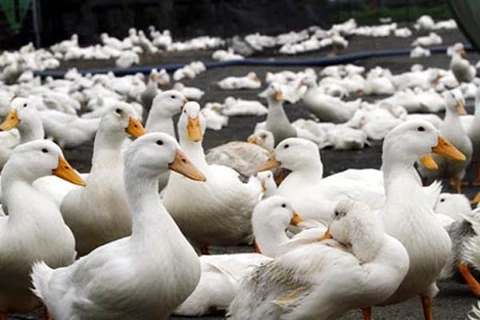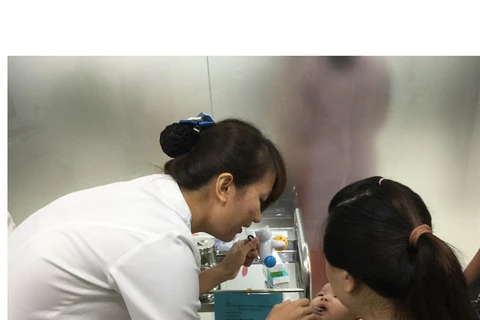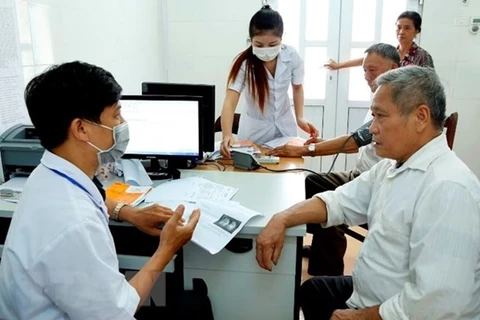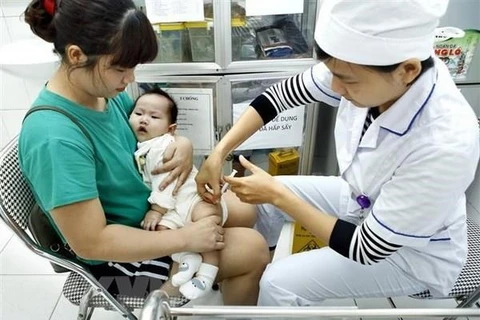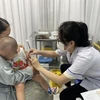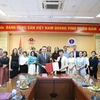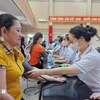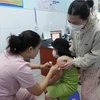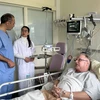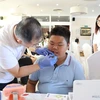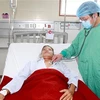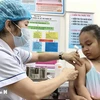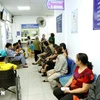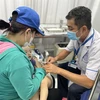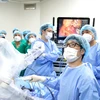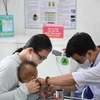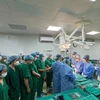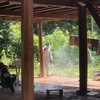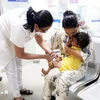 A medical worker at Tuong Son commune Health Centre in the central province of Ha Tinh's Thach Ha administers vaccinations to local children. (Source: VNA)
A medical worker at Tuong Son commune Health Centre in the central province of Ha Tinh's Thach Ha administers vaccinations to local children. (Source: VNA)Hanoi (VNA) - Disease prevention and control is the main duty of the health sector this year, thus the sector will actively conduct preventive measures and provide vaccinations in high-risk areas.
Minister of Health Nguyen Thi Kim Tien made the statement in a nationwide online conference on June 11.
The conference, connecting nearly 700 districts and towns in 63 provinces and cities, aimed to implement plans covering diseases prevention and control and safe vaccinations. It also updated professional guidance for district-level health centres.
Speaking at the conference, Tien said vaccinations were one of the most important measures to prevent dangerous infectious diseases.
Thanks to vaccination programmes over the past 30 years, many dangerous infectious diseases had been eliminated.
Vietnam successfully eliminated polio in 2000 and tetanus from birth in 2005. The results had been maintained until now.
Other infectious diseases such as measles, diphtheria and whooping cough caused epidemics many years ago. Now they have been brought under control thanks to regular vaccinations. Vietnam is striving to eliminate malaria, measles, rabies and control rubella, said Tien.
Experts from the Ministry of Health (MoH) said new dangerous diseases from other countries could enter Vietnam, and domestic diseases such as hand-foot-mouth, measles and dengue fever could worsen due to climate change, urbanisation, population density and emigration.
According to the experts disease prevention faces challenges because the country does not have specialised medicines and vaccines for measles and hand-foot-mouth disease.
Moreover, citizens’ awareness of disease prevention is not high enough. Some groups of residents do not collaborate with local authorities and the health sector in preventing the spread of disease, and do not actively implement measures to ensure personal and environmental hygiene. Some residents refused to give their children vaccinations.
Minister Tien said the Government issued decrees on vaccinations whereas the MoH promulgated guidance circulars. These provided important legal foundations creating good conditions for vaccination work.
During the conference, experts from the National Hospital for Tropical Diseases, the National Paediatrics Hospital, the National Institute of Hygiene and Epidemiology (NIHE) and other hospitals provided information on supervising, treating and preventing several dangerous diseases such as dengue fever and hand-foot-mouth. They updated attendees on new treatments and emergency aid for patients suffering side-effects after receiving a vaccination.
Associate professor Tran Nhu Duong, deputy director of the NIHE, said for infectious diseases, prevention should be the focus.
Local authorities should set up preventive plans based on their climate and geographic conditions, and prepare enough medicines.
Grassroots-level medical centres could classify patients – who should be hospitalised and who can be treated as outpatients – to reduce side effects and fatalities, he said. — VNA
VNA
